Rottweilers are renowned for their strength, loyalty, and intelligence. These traits make them incredible companions and protectors. However, a proper diet is crucial to maintain their robust health and vitality. This guide delves into the ideal diet for Rottweilers, ensuring they receive the nutrition they need for a long, healthy life.
Understanding Rottweiler Nutritional Needs
Rottweilers, like all dogs, require a balanced diet, but their larger size and active nature demand specific attention to their nutritional needs. Protein is the cornerstone of their diet, supporting muscle development and maintenance. Fats provide energy and support skin and coat health, while carbohydrates offer additional energy and fiber. Vitamins and minerals are essential for immune health, bone strength, and overall wellbeing.
Our 5 Top Foods for Rottweilers
The diets were selected by our founder Justin Palmer, a certified canine nutrition expert, specifically with Rottweilers in mind:
| Food | Pros | Cons |
|---|---|---|
|
|
|
|
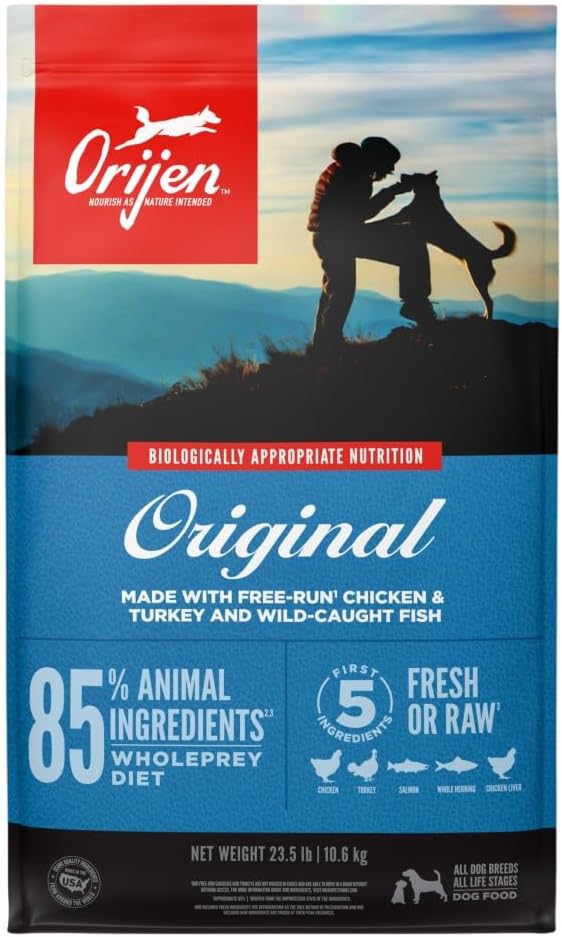
Check Today's Price on: |
|
|
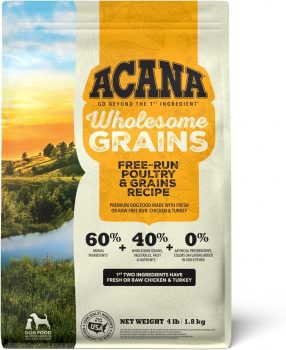
Check Today's Price on: |
|
|
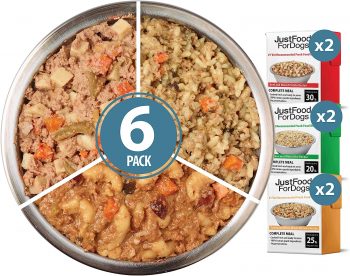
Check Today's Price on: |
|
|
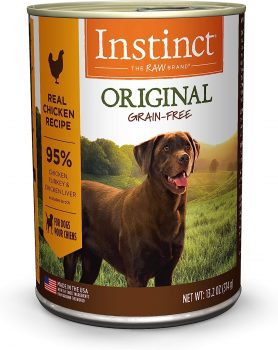
Check Today's Price on: |
|
|
The Role of High-Quality Protein in a Rottweiler’s Diet
Protein is vital for Rottweilers. It helps in muscle building and repair, especially for this muscular breed. High-quality protein sources like lean meats, eggs, and fish should form a significant portion of their diet. The amino acids in these proteins are the building blocks for a healthy Rottweiler.
Balancing Fats: Essential Fatty Acids for Healthy Coats and Skin
Fats are a key component in a Rottweiler’s diet, particularly omega-3 and omega-6 fatty acids. These fats contribute to a shiny coat, healthy skin, and overall energy levels. Sources like fish oil, flaxseed, and certain meats are excellent for providing these essential fatty acids.
Carbohydrates and Fiber: Energy and Digestive Health
While proteins and fats are the main focus, carbohydrates also play a role in a Rottweiler’s diet. They provide energy and contain fiber, which aids in digestion. Whole grains, vegetables, and certain fruits can be good healthy carbohydrates and fiber sources.
Vitamins and Minerals: Supporting Overall Health
A balanced diet for a Rottweiler must include the right mix of vitamins and minerals. These nutrients support various body functions, including bone health, blood clotting, and metabolic processes. Commercial dog foods are often fortified with these, but supplements can be considered under veterinary guidance.
Proper Hydration: The Importance of Water
Hydration is as important as food. Rottweilers need constant access to fresh, clean water. Dehydration can lead to serious health issues, so ensuring they drink enough water is crucial for their health.
Feeding Schedule: Timing and Portion Control
Rottweilers benefit from a structured feeding schedule. Typically, two meals a day is recommended. Portion control is essential to prevent obesity, a common problem in the breed. The amount will vary based on the dog’s age, size, and activity level.
Special Dietary Considerations for Rottweiler Puppies
Rottweiler puppies have different dietary needs from adults. They require more calories and nutrients to support their rapid growth. Puppy-specific formulas that cater to their developmental needs are recommended.
Addressing Common Health Issues with Diet
Rottweilers are prone to specific health issues like hip dysplasia and bloat. A diet that supports joint health and is easy to digest can help mitigate these risks. Discussing specific dietary needs with a vet is always advised, especially for dogs with health concerns.
Choosing the Right Food: Kibble, Wet, or Raw?
There’s a range of options for feeding Rottweilers: kibble, wet food, and raw diets. Each has its pros and cons. High-quality kibble can be convenient and balanced, while wet food can be more palatable. Raw diets offer freshness but require careful handling.
Supplements: Are They Necessary?
While a well-balanced diet should provide all the necessary nutrients, some Rottweilers might benefit from supplements. Glucosamine and chondroitin are joint supplements for joint health, omega-3 fatty acids for coat quality, and probiotics for digestive health. Consultation with a vet is vital before starting any supplement regimen.
Human Foods: What’s Safe and What’s Not
While some human foods are safe for Rottweilers, others can be harmful. Safe foods include lean meats, certain vegetables, and fruits like apples and carrots. Foods to avoid include chocolate, grapes, onions, and foods with xylitol.
The ideal diet for a Rottweiler supports their unique nutritional needs through all stages of life. A balanced blend of proteins, fats, carbohydrates, vitamins, minerals, and plenty of water will contribute to their overall health and well-being. Regular consultation with a veterinarian can ensure that your Rottweiler’s diet continues to meet their evolving needs. Remember, a well-fed Rottweiler is a happy, healthy companion for years to come.
What Health Issues Are Rottweilers Prone To, and How Can a Proper Diet Help?
Rottweilers are a robust and loyal breed, known for their strength and protective nature. However, like all breeds, they are prone to specific health issues. Understanding these health risks and how diet can play a role in prevention and management is crucial for every Rottweiler owner. This article explores common health concerns in Rottweilers and how a proper diet can mitigate these risks.
Hip and Elbow Dysplasia in Rottweilers: The Role of Nutrition
One of the most common health issues in Rottweilers is hip and elbow dysplasia, a genetic condition where the joints develop improperly. This can lead to arthritis and mobility issues. A diet rich in omega-3 fatty acids, found in fish oil and flaxseed, can help reduce inflammation. Additionally, maintaining a healthy weight through a balanced diet can alleviate joint stress.
Obesity: A Preventable Threat to Rottweiler Health
Obesity is a significant health risk for Rottweilers, contributing to heart disease, diabetes, and exacerbating joint issues. A diet with appropriate calorie content, balanced with regular exercise, is key. Avoiding excessive treats and human food can also prevent weight gain. High-quality, nutrient-dense food ensures they get what they need without excess calories.
Bloat and Gastric Torsion: Dietary Management Strategies
Rottweilers are susceptible to bloat or gastric torsion, a life-threatening condition where the stomach fills with gas and sometimes twists. Smaller, more frequent meals, avoiding vigorous exercise around meal times, and preventing rapid eating can help. Foods that are easy to digest and don’t produce excessive gas can also reduce the risk.
Managing Allergies and Skin Issues Through Diet
Rottweilers may suffer from allergies and skin issues, often as itchiness and poor coat quality. A diet free from common allergens like corn, wheat, and soy can be beneficial. Foods rich in omega-3 and omega-6 fatty acids can improve skin health and coat quality.
Cardiac Health in Rottweilers: The Importance of a Balanced Diet
Heart disease is a concern in Rottweilers. A diet low in sodium and rich in heart-healthy nutrients like taurine and L-carnitine can support cardiac health. Avoiding fatty treats and getting regular exercise are crucial for maintaining a healthy heart.
Cancer Prevention: Nutritional Considerations
Rottweilers have a higher risk of certain types of cancer. A diet rich in antioxidants, found in fresh fruits and vegetables, can help reduce the risk of cancer. Avoiding processed foods and those with artificial additives is also advisable for cancer prevention.
Joint Health: Nutrients That Support Mobility
Joint health is vital for Rottweilers, especially as they age. Supplements like glucosamine and chondroitin, often in senior dog formulas, can support joint health. A diet with adequate but not excessive protein can also help maintain healthy muscle mass, supporting the joints.
The Impact of Diet on Rottweiler Dental Health
Dental health is often overlooked but is crucial for overall health. Dental issues can lead to more significant health problems. Dry kibble can help reduce plaque and tartar build-up. Regular dental check-ups, along with a diet that includes chewable toys or treats, can help maintain oral health.
Kidney and Liver Health: Dietary Management
Rottweilers can be prone to kidney and liver issues. A diet low in phosphorus can help manage kidney disease, while a diet with high-quality protein sources benefits liver health. It’s essential to work with a vet to tailor the diet to the specific needs of a dog with kidney or liver concerns.
Aging Rottweilers: Nutritional Needs for Senior Dogs
As Rottweilers age, their nutritional needs change. Senior dogs may require fewer calories but more of certain nutrients, like omega-3 fatty acids and antioxidants. Adjusting their diet to include senior-specific formulas can help address these changing needs.
Conclusion
Understanding the common health issues Rottweilers face and how diet can play a role in prevention and management is key to ensuring a long, healthy life for these loyal companions. A balanced diet tailored to their specific needs, along with regular veterinary check-ups, can help mitigate many of the health risks Rottweilers are prone to. Remember, each Rottweiler is unique, and their dietary needs may vary, so it’s essential to consult a veterinarian for personalized advice.
Frequently Asked Questions About Feeding Rottweilers
1. What is the best type of food for a Rottweiler?
High-quality, balanced dog food rich in protein is best for Rottweilers. It should include real meat as the first ingredient, and be appropriate for their age, size, and activity level. Avoid foods with excessive fillers or artificial additives.
2. How much food should I feed my Rottweiler daily?
The amount of food depends on the Rottweiler’s age, weight, and activity level. Generally, adult Rottweilers require about 2 to 3 cups of dry food per day, divided into two meals. Always consult your vet to determine the appropriate portion size for your dog.
3. Are grain-free diets good for Rottweilers?
Grain-free diets can benefit Rottweilers, especially if they have allergies or sensitivities to grains. However, ensuring they still receive a balanced diet with all the necessary nutrients is essential. Consult with a veterinarian before switching to a grain-free diet.
4. Can Rottweilers eat human food?
While some human foods are safe in moderation, many are not. Safe options include plain, cooked meats, certain vegetables, and fruits like apples and carrots. Avoid feeding them onions, chocolate, grapes, and foods with xylitol.
5. How often should I feed my Rottweiler?
Rottweilers should typically be fed twice a day – once in the morning and once in the evening. This helps prevent bloat, a common issue in the breed and maintains a steady energy level throughout the day.
6. Is it okay to give my Rottweiler bones to chew?
Giving your Rottweiler bones can be risky. Cooked bones can splinter and cause internal damage or blockages. If you give bones, ensure they are large, uncooked bones like beef or lamb shanks, and always supervise your dog while they chew.
7. What supplements should I add to my Rottweiler’s diet?
Supplements like fish oil for omega-3 fatty acids, glucosamine, and chondroitin for joint health can be beneficial. However, supplements should only be added under veterinary guidance to ensure your dog’s diet remains balanced.
8. Can Rottweilers be fed a vegetarian diet?
While it’s technically possible to feed Rottweilers a vegetarian diet, meeting their nutritional needs without animal proteins is challenging. A vegetarian diet should be done under strict veterinary supervision to ensure all nutritional requirements are met.
9. How can I tell if my Rottweiler is overweight?
An overweight Rottweiler will have a less visible waist and no palpable ribs under a thin layer of fat. Regular check-ups with a vet and monitoring their body condition can help determine if they are overweight and need a diet adjustment.
10. What should I feed my Rottweiler puppy?
Rottweiler puppies should be fed a high-quality formula rich in protein and fat to support their rapid growth. The food should be formulated for large breeds to ensure proper bone and joint development.
11. Is it safe to switch my Rottweiler’s food?
You can switch your Rottweiler’s food, but it should be done gradually over a week. Start by mixing a small amount of the new food with the old, gradually increasing the new food and decreasing the old to avoid digestive upset.
12. How can diet prevent health issues in Rottweilers?
A proper diet can help prevent obesity, joint problems, and allergies. Foods rich in omega-3 fatty acids can support joint and coat health, while balanced calories can prevent obesity, a common issue in Rottweilers.
13. Should I feed my Rottweiler wet or dry food?
Both wet and dry foods have their benefits. Dry food is convenient for dental health, while wet food can be more palatable and hydrating. Some owners opt for a combination of both. Choose high-quality options regardless of the type.
14. What are the signs of food allergies in Rottweilers?
Signs of food allergies in Rottweilers include itchy skin, ear infections, chronic diarrhea, and vomiting. If you suspect your Rottweiler has a food allergy, consult a vet who may recommend an elimination diet to identify the allergen.
15. How do I know if my Rottweiler’s diet is nutritionally balanced?
A nutritionally balanced diet for a Rottweiler should result in a shiny coat, healthy weight, regular bowel movements, and overall good health. If you’re unsure about your dog’s diet balance, consult a veterinarian for advice and possible dietary adjustments.
 Check Today's Price on:
Check Today's Price on: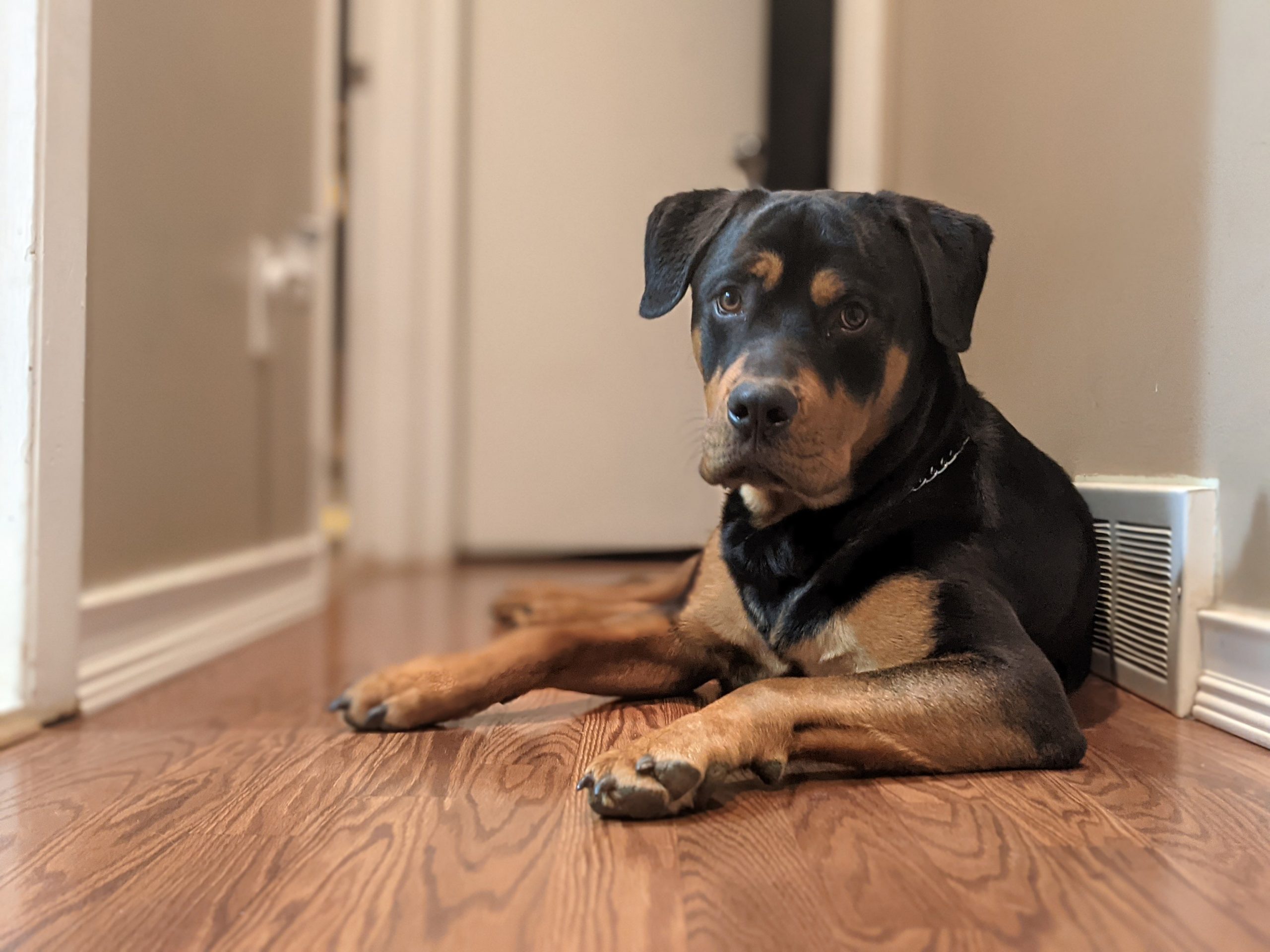
 Toledo, United States.
Toledo, United States.